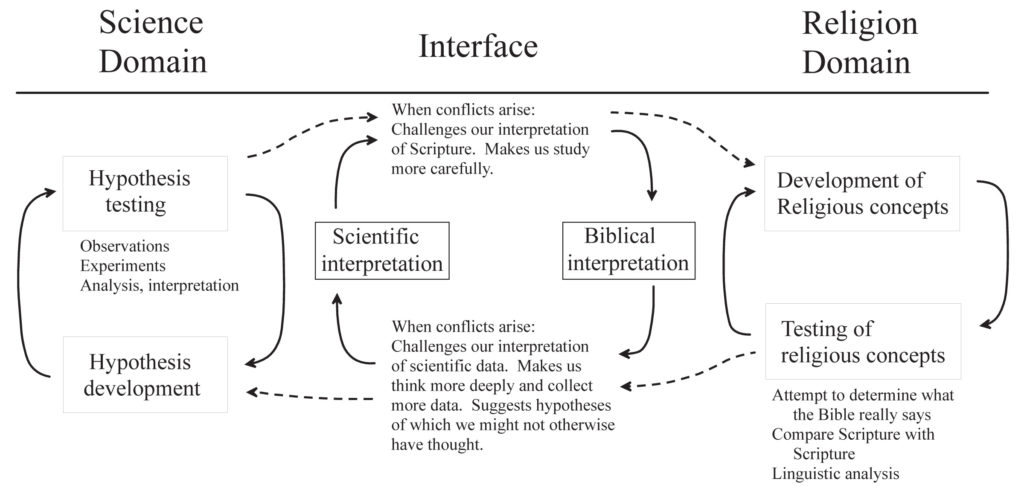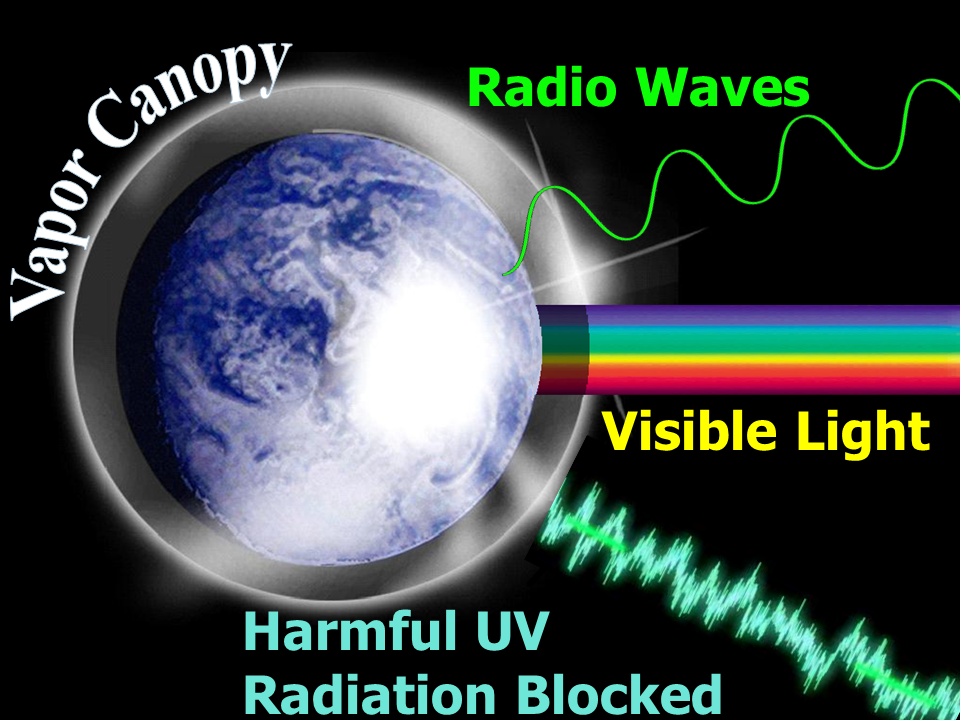Young-earth creationists are interested in science because we want to better understand the Creator’s world in light of His Word. However, science is an ongoing enterprise, and new data is turning up all the time. Often, this data falls right in line with our expectations based on a young-earth perspective. Sometimes we can explain it better than our old-earth colleagues! Other times, the data is harder to explain from within a young-earth context. Just what do creationist researchers do with incoming data?
Where Does the Bible Fit in the Scientific Process?
A Model of Integration
Paleontologist Dr. Leonard Brand has developed a helpful model for understanding incoming data.1 This perspective has been used by creation scientists for decades. It helps to explain data and keep biases (whether secular or religious) in check. Advocates of this model propose that if scientific and biblical data are properly understood, harmony will be found between them. They also hold the scientific method to be a powerful and effective way to solve the mysteries the Creator has hidden throughout Creation. Dr. Brand believes the answer to the concern of biases is the integration of religion and science, with God having priority in our thinking. The diagram below best illustrates the model he developed:

This approach holds that the biblical text is not a science textbook. It is, instead, to be understood according to its obvious meaning unless a symbol or figure is employed. This approach accepts the events described in the Bible as real and historical. Science is viewed as an open-ended search for truth; it cannot settle for rules that will restrict that search. (Naturalism is one example of such a rule, as it dictates that supernatural intervention has not happened in the universe at any time, past or present.)
Brand’s model also acknowledges, however, that all scientific and biblical models are subject to the limited knowledge and fallibility of sinful human beings. We can best tackle conflicts that arise between the clear teaching of Scripture and current scientific models through further scientific investigation. At the same time, we must be careful to keep in mind that our understanding of Scripture is not unerring; it is subject to reassessment within the confines of Scripture.
Using Religion and Science in the Quest for Truth

Humanity has wrestled with the question of how science and religion should interact for centuries, perhaps as early as the time of Copernicus and Galileo. We need to make sure we are careful to learn from the other side of history. Church leaders persecuted scientists and their ideas not because they were against Scripture, but because the leaders were concerned with scientific theories violating their own understanding of the world, not the Scripture’s understanding of the world.
Dr. Brand’s model recognizes that the methods of scientific research and religious study are different and we should not conflate them.
Religious concepts are not directly tested by scientific methodology. Scientific concepts are not directly tested by religion.
This is because it is possible for us to misunderstand data from either source. Keeping the conclusions of each temporarily separate in our minds allows us to dig deeper into both science and religion without accepting the first explanation that pops into our heads. The important part of this model is integration, especially when conflicts between religion and science occur. This triggers more careful research in both areas. Science and religion can both provide ideas that we can utilize to generate new ideas, hypotheses, or predictions. As far as science goes, the actual act of doing science is largely indistinguishable from that done by our conventional colleagues. The only differences are the types of questions we ask, the data we are likely to take notice of, and the types of explanations we consider worth investigating.
There are dangers we face as we try to synthesize scientific data with historical data gathered from the pages of Scripture. For example, what happens when we hold a religious view that is not biblical, but dogmatic, and science disproves it? Are we to let our faith in the Bible as a whole be disproved unnecessarily?
What Would Change Our Mind?

At one time most young-earth creationists believed in the vapor canopy model. This idea proposed that the “firmament” made on the second day of Creation was a layer of water vapor which had once encircled the earth. Proponents thought that the canopy had fallen at the start of the Flood, providing enough rainwater to last 40 days and 40 nights.
However, although the canopy theory was based on the Bible, it was deeply flawed.2 If the canopy had existed, continual divine intervention would have been needed to stop the earth from overheating. Although it is possible that God could have created a water canopy above the earth, and supernaturally cooled the atmosphere, this is not implied by the text. Christians must be careful not to ascribe to God that which He has not attributed to Himself. Instead, we need to reevaluate our scientific model, and the text upon which it was based, and ask God for clarity. Creationists reassessed the Scriptures and came to the conclusion that the Biblical text did not necessitate a vapor canopy.
“Failure is Success in Progress.”3
The vapor canopy model is one example that shows how creation science changes over time. There will always be disparity between our current understanding of the world and the new information we discover daily. This reality is what fuels the pursuit of the scientific endeavor: the desire to resolve the dissonance between what we believe to be true in our minds and what is true to our sensory perceptions. Although our models may be based on the infallible Word of God, they can still be inaccurate or completely wrong. This doesn’t mean that the Bible itself is wrong, just that the way our model uses or interprets it is.
But how do we determine validity within a scientific model, even if the model is ultimately wrong? Just because a scientific model is wrong does not mean it is useless or a failure. The history of science is riddled with scientific models that, while incorrect, helped scientists to explain available data, propose testable hypotheses, and even make successful predictions later. This is a hallmark of a good scientific model. Therefore, the fact that a particular scientific model cannot explain all the data does not mean we should toss it out or change our minds on the model as a whole. It may be more likely that the scientist(s) has the right idea and is moving in a good direction, meaning that the model is partially correct. More research is required to differentiate the parts of the model that are correct from the parts which are not.
When Creationists Disagree

As we study the world, it is quite likely that we will find significant points of scientific disagreement even with brothers and sisters in the Lord. Young-earth creationists hold conflicting views on many topics including the placement of the Flood boundary, the usefulness of statistical baraminology, whether feathered dinosaurs existed, if australopithecines were bipedal, etc… The Bible lays the basis for our understanding of these topics, but it does not direct us towards specific scientific conclusions. Creationists can study the same evidence, and come to separate opinions. That’s okay. We are all exploring different options that could lead us to the objective truth of God’s creation. This doesn’t mean that either side is dishonest or disingenuous.
God calls us, as Christians, to be honest, rigorous, and empirical. In science, this means that we need to perform experiments, make models, and test them against Scripture and the natural world. The Bible should shape the way in which we interact with fellow scientists, Christian and non-christian alike.
Courage and Humility
When disputes arise between creationists, it is important to remember that character is as important as correct interpretation. Being “right” about an issue means nothing if we sacrifice or undervalue our character and virtue. The first step towards respectful disagreement is to admit that we might be mistaken. This takes a significant amount of intellectual courage and humility. Time has proven that gospel-believing Christians can (and have) misunderstood or misinterpreted the Scriptures. The first step in discussing controversial topics is accepting that we are those Christians. This is difficult to do, especially when we firmly believe we are in the right about something as meaningful as Scripture. But all human interpretations of Scripture are equally fallible. If we are to expect others to critically evaluate their position, we must be willing to do the same.
Intellectual Tenacity
Of course, we should not treat everything as merely “interpretations.” We should not consider the resurrection of Jesus as one possible exegesis of Scripture we may have misunderstood. The gospel is not up for debate. As we learn from those we disagree with, and even pursue scientific and biblical truth alongside them, we must remain firm in truth. This takes intellectual tenacity. Without tenacity, our courage and curiosity can lead us away from our convictions of the truth. Galileo was tenacious when he continued to advocate for theories that were condemned by the Aristotelians. Intellectual tenacity can be just as difficult as humility and fair-mindedness, especially if everyone around you seems to disagree. But it is also just as necessary. As G.K. Chesterton once famously remarked, “do not be so open-minded that your brains fall out.”
We must have the integrity and faith to follow the evidence, be willing to have our ideas challenged, and to consider possible alternatives where Scripture allows us the freedom to do so. And if further down the line we discover that we were wrong, we must have the humility to admit it.
Conclusion

Right now, we live in an exciting time where millions of scientists all over the world are making new discoveries, collecting data, and sharing what they have discovered with the world. It can be a lot to process, especially when what is discovered sometimes seems to conflict with the history recorded in God’s Word. We must begin by recognizing that unlike science, the Bible is infallible. As such, it guides the direction and approach which we take to science. In places where the Bible is silent, creation scientists cannot be dogmatic. Critical self-reflection is important for the progression of creation science. We must evaluate our convictions, interpretations, and models to make sure that they align with the scientific evidence and, ultimately, Scripture.
Creation science, like all science, is not static. New hypotheses and theories give way to a better understanding of the physical evidence, and that better understanding leads to the building of better models. And the cycle repeats. This is the thrilling ride that is the scientific process. Welcome aboard!
Footnotes
- Brand, L. R. (2006). “A biblical perspective on the philosophy of science.” Origins, 59, 6-42. ↩︎
- Worraker, W. (2020). “Heat Problems Associated with Genesis Flood Models—Part 3: Vapour Canopy Models.” Answers Research Journal, 13, 69–94. ↩︎
- Albert Einstein, as reported in Firestein S. Failure: Why Science is So Successful. Oxford University Press, Oxford. 2016. ↩︎












Needed and cool summery of these matters. Yes creationists disagree about feathered dinos but this creationist disagrees there were dinos and surely theropod ones were just flightless ground birds and probably had feathers
biblical kinds should undercut these great divisions humans put Gods creation in. lIkewise down with mammals, reptiles, etc as they don’t exist I suggest.
Organized creationism in a more intelligent world we live in simply contends, very weell, with the misuse of science to deny God and Genesis. In other words we take on the greeks and not just the Romans from a biblical teaching.
We take on human intelligence. Yes we must not be jerks to each other and love and agree to disagree and persuade. Proverbs says in contentions there is pride. Thinking people must not get mad because others reject their thinking was right..We are the good guys, the smarter guys, and the attrition of truth is at our back. We are very famous these days despite a population mostly disinterested. they ain’t seen nothin’ yet.
To put it rather bluntly, if young earth creationists would permit scientific data and findings to challenge their interpretations of Scripture they wouldn’t be young earth creationists anymore. But as long as your model is figuring out the best way in which to somehow fit discordant scientific evidence into a narrow exegetical frame based on a pre-scientific understanding of the universe, you simply cannot do science in any productive manner, as much as you may genuinely desire to do so; it’s rather like playing golf blindfolded, deliberately preventing yourselves from reaching meaningful solutions by a vast array of epistemic constraints concerning what you’re allowed to see or find. Hyper-naturalists commit a similar error in previously determining that only the scientifically observable material world exists and that a priori there is nothing else; everything must then be modified to fit such assumptions, leaving no room in their exegesis of the world for God or the spiritual or even the metaphysical.
Science certainly needs theology, and vice versa, but there must also be an element of epistemic boundedness, say somewhere between the level of YEC totalism and Gould’s separate magestarium. Science is not qualified to speak to the nature of the Holy Trinity, for instance, while faith does not explain the details of gravity or natural selection. Theology can and should speak to the meaning of nature and natural processes as part of God’s Divine wisdom and providence, while science can give us a better sense of how God creates and how His providence and wisdom unfold in the contingent world.
Y’all seem almost there- wanting to genuinely do science, and to do it in a manner that brings God glory and reveals His wisdom in the world, and that’s wonderful! Perhaps in time you’ll get to a point at which you can embrace the full findings of science while also remaining committed to theological truth, accepting that, as has often happened, our interpretations of Scripture and Christian doctrine were not so much wrong as partial and unfolding, and that the unfoldings of science and the resultant changes in our interpretations do not harm the truth of Scripture but instead bring it into a new light. Almost all Christians, flat earthers and geocentrists aside, now not only embrace modern views of the solar system and cosmos but rightly see those truths as expanding the truth of Scripture, not challenging it; I do think that in a similar way in time the age of the cosmos and the processes of evolutionary development will be seen the same way by the vast majority of Christians, without harm to the faith, quite the contrary.
Hello Jonathan,
Thank you for your feedback. I appreciate your desire to balance science with the Scriptures. It is true that we are approaching science from a biblical framework, however, as you point out, the general understanding of science changes with time. It can be dangerous to unquestioningly accept the current conventional scientific understanding just as it can be dangerous to unquestioningly accept unfounded biblical doctrines. This is why integration is important. Science can provide us with testable hypotheses we can test against Scripture, and Scripture can provide us with testable hypotheses we can test against the scientific consensus. God created both the world we live in and His Word, and so it makes sense that we should be able to learn from both. However, it is easier to misinterpret the natural world because it does not speak, while God does speak to us through Scripture. And we know this because science has been wrong on a number of occasions throughout its history. We have found that when we unquestionably accept scientific claims and change our interpretation of Scripture, we often miss certain observations in the scientific data. Ultimately, because we don’t (and can’t) know everything, we cannot prove that our understanding of Scripture or the science is correct. What we do know, however, is that the validity of an interpretive framework can be measured by its usefulness in explaining data, generating new testable hypotheses, and making predictions about future findings. As Christians, we have both scientific data and biblical data to contend with, so our goal is to find the explanation with the most explanatory power for both.
Thanks for the reply! I think your remarks clarify what I see as a couple of fundamental problems with YEC: one, Scripture is not meant to be a source of testable scientific hypotheses, there is nothing in Scripture itself to suggest such. Rather, we read in 1 Timothy, “All Scripture is breathed out by God and profitable for teaching, for reproof, for correction, and for training in righteousness, that the man of God may be complete, equipped for every good work.” It would be a very great stretch indeed to take this to mean that the Bible is going to inform us about, I don’t know, particle physics or climatology, or that we should take the text for such- or that we ought to try and use it for other more esoteric things such as letterism or numerological predictions, that sort of thing. God did not inspire Scripture to explain the origins of fossils, or explain natural processes of weather or natural selection or the physics of light; I’d go so far as to say that trying to make Scripture bring forth such things is a reading into the text and contravenes God’s intention. That is not to say that Scripture is one-dimensional; I believe, in keeping with Christian tradition, that there are many layers of meaning and interpretation to Scripture, but that they have to be informed by the inner purpose and meaning of the Bible as a whole. We cannot just read in anything we like.
Which brings me to my second point: there is really nothing straight-forward about reading and interpreting the Bible. In fact in some ways it is more challenging, precisely because it is complex and powerful and spiritually layered and dense. This is not necessarily a problem- for much of Christian history many interpretations and understandings co-existed, within a certain range to be sure (ie Gnostic interpretations were rejected), without creating division within the wider Church. In more recent centuries things have changed, let’s say, with many divisions within Protestant Christianity based on deep disagreements over how Scripture is to be read and interpreted. What seems obvious to me does not necessarily seem obvious to you at all- and not because one of us is being malicious or obtuse. Without going too far down this road, it’s enough to say that it would be unwise to present an unchanging Bible against the changes of science- not because the Bible has changed over the past 2000 years or because nature is changing but because interpretation of both changes over time. Indeed I’d argue that changes in human knowledge of the natural world are precisely why the Bible was written as it was- we in the modern world with modern science represent a tiny sliver of the humans to whom the Bible was and is addressed, the vast majority of which lived (and many of which still live) in the context of ‘traditional’ cosmology much closer to the pre-scientific images we see in Scripture.
But the fact that Scripture was written in a world of pre-scientific understanding does not negate the theological and spiritual truths it presents. We continue to thank God for His provision of the sun and rain and soil, even though we now have complex understandings of astronomy, meteorology, and soil science; Scripture about the sun and moon and God’s role in their continued existence and operation still proclaim theological truth even if we no longer take their imagery literally as did ancient authors and readers. Science gives us insight into the physical, material mechanisms of the natural world; Scripture gives us insight into the inner, spiritual meaning and God’s providential care and love working in and through those mechanisms, teaching us that it is His Wisdom which called the world into being with all its complexity and balance and aptitude for life, Wisdom which continues to sustain the world in all its processes.
I’m not saying it’s always easy to figure out how to strike the right balance of understanding between science and Scripture- but we have very similar problems in interpreting Scripture, especially the Old Testament, in light of Christian doctrine and ethics. And that’s ok!
I’d just close by saying it’s important not to mix scientific approaches with those of faith: while my faith in Christ is not irrational or without basis in certain intellectual reasons, those reasons are not the ultimate basis of my faith, and I do not apply the same kind of critical reasoning to spiritual and theological matters that I do to scientific ones. There’s a lot to unpack in the difference, but a big one really is that ultimately my faith is in a Person, not in an idea or a set of facts or data or a text, and is expressed in a relationship. I don’t have faith in geology or evolutionary biology, or a relationship with them- they have proven useful as descriptors of the natural world, which itself has value and legibility because it is the handiwork of the Triune God (insofar as faith is involved, I do have faith that the world is real, orderly, and can be reasonably observed- this faith is in part rooted in my faith in God as Creator, in part because I don’t have good reason to think it is otherwise, brain in the vat stuff not being very convincing). My faith does not depend on changing interpretations in science, and I’d be willing to adjust my thought to better accommodate the evidence. Does this mean my interpretation of Scripture would have to change? Sure- but that’s ok too! We have a very different understanding of the world from the authors of Scripture, but if anything our understanding makes the theological truths they expressed all the more spectacular- just knowing how much more massive the sun and stars and the massive expansive of space is magnifies God all the more, even if that cosmology is different from the cosmology of the (human) authors of Scripture. Likewise, to know that God is God of the depths of time, and that His work extends into the deepest past, His care and providence embracing hundreds of millions of years of life and history, is spectacular, and makes His love of us and His willing entry into our history all the more wonderful, the sheer graciousness of His love all the more brilliant.